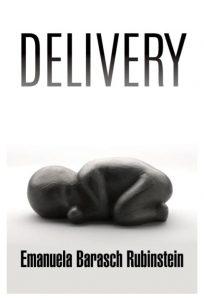Delivery, by Emanuela Barasch Rubinstein, launches today, and her second guest post is the opening chapter; which offers the viewpoints of both the new mother and the new father:
Afterbirth
Now that it is all over—life’s first cry, the exaltations and tears of joy, the newborn baby taken to be weighed and measured, the stains of blood and amniotic fluid washed off, the narrow incision stitched, the sweat wiped from my forehead—a sigh of relief escapes me, almost against my will. In spite of the hustle and bustle, the midwives’ lively conversation, a cleaner dipping a mop in a bucket and wiping the floor over and over again, a doctor asking for a senior colleague’s advice, I feel silence enveloping me. No one is demanding that I breathe vigorously, that I strain my body to its very limit, or that I try, in vain, to stop a cry of pain. I am left alone, as if I were an old musical instrument that after much effort has made an ancient sound and now is placed back in its case.
Amir has left the delivery room to call the family and tell them that a healthy baby was born. I hear his excited, somewhat cracked voice coming from the corridor; he adopts a practical tone but is unable to conceal its trembling. The baby’s weight is almost three kilograms. When he came into this world the doctor turned him upside down and only then did he begin to cry loudly. Amir says he doesn’t know who he looks like, probably both of us—only his skin is shrivelled and wrinkled like that of an old man, maybe because he remained in the womb two weeks longer than expected, and two hours without amniotic fluid. Amir hastened to end the call and now he is phoning my parents, repeating the description of the birth, not leaving out the slightest detail. It is already a script that he has learned.
I am lying in a maternity bed: my body is clean, the incision is covered with a bandage, but I can’t move. A chill is spreading within me, like an invisible shudder, a final quiver of disfiguring pain. Something is vibrating within my feet, advancing towards the bleeding wound, passing the abdomen and going up, intermingled with rapid heartbeats, making my breathing heavy. My body is rebelling. I close my eyes, thinking: here, it is all over, the pain is gone and all that is left of it is residual bleeding; but my dizziness proves that it cannot simply be swept away in an instant. The room is clean and sterile, the strong lights are turned off, I am wrapped in a pleasant blanket, the nurse brings me water, and I hear the staff saying that the room should be vacated as another woman in labour is coming. I find it hard to grasp how the heavy burden has suddenly disappeared, and all I have is a wordless memory of pain, a sensation fierce and acute that now only stings.
Amir returns to the room, looking at me with concern. He comes to my side and begins caressing my hair. “Relax, everything went well, the baby is fine, everything is okay.” In spite of his casual tone he is looking anxiously at the lights, at a pack of towels at the side of the bed, at the syringes placed on a shiny tray; he stretches out a hand and grabs a bottle filled with pink fluid, grasping it and then putting it back on the tray; his hair, speckled with grey, is slick with sweat; his tee shirt is wrinkled and stained; he is staring at the walls like a boy who is made to spend time with a distant aunt, seeking to conceal his desire to run to the entrance, to be gone without waiting for the door to close. But he remains seated, and even tries to have a conversation.
After a couple of minutes he caresses my head again, and then says quietly, as if conveying a secret, “I’m going to see the baby.” Here, finally, a serious excuse has been found, something that would not appear as a pretext but as a valid and important reason for him to kiss me and leave the room. The way he looks at the entrance is so obvious, I’d rather he would simply say: Daphne, I can’t take this place anymore, I must get out. But he insists and lingers for a while before walking out, at first hesitantly, then with an appearance of justified decision.
A loud scream comes from the corridor: a woman shouting “I can’t take it anymore, I can’t take it anymore.” Two nurses rush into the room. They cover me and roll the bed away. “6cm dilated, the room has to be readied quickly, she’ll be in active labour soon.”
I hear them talking as they push me into another room, placing the bed next to the window before rushing to the woman who has just come in. Isolating silence fills this room, and the screams of horrid pain cannot be heard here.
*
Finally, the labour is over. I can’t stand this room for another moment. Though the blood has been completely wiped away, and all those repulsive fluids discharged by the human body have been cleaned up, and the stained towels have already been tossed into a bag, Daphne is lying in bed with eyes closed and I am eager to get out, to walk quickly through the corridor, to pass the cafeteria at the entrance of the hospital and, at last, step outside. God, how I long for some fresh air. I thought I would choke in that room. Her painful cries are still present there, the awful yelling that turned into a choked weeping between long, strangely frightening bouts of heavy breathing. The midwife took the baby, wrapped in a towel, and the doctor left the room, but I find it hard to believe that all this unbearable pain has simply faded and disappeared.
Daphne opens her eyes. Softly she asks where the baby is and pats my wrist, looking at me distantly. Fleetingly I think I see a spark of despair in her eyes.
“In a minute the nurse will bring him back,” I answer, thinking that if the infant were here I would not be able to leave. I sit beside her: her dark red hair looks almost black, perhaps with sweat—sweat covered her, rolled down her forehead, her eyebrows, her cheeks.
I find it hard to sit next to her now. During the pregnancy I felt there was something cheerful and inviting about the curved stomach, the growing and expanding body. Even though her belly kept protruding, I found the welcoming roundness apparent also in the softening of her facial features, the beautiful full breasts, the smooth arms that no longer had a virginal appearance; even in the slightly swollen legs.
But now she seems empty. I try to talk, but I keep looking at her body, thinking she is hollow, that all that filled her is gone. Her face, which always had a healthy glow, is now pale and bluish. And her stomach, which now I realize had stretched immensely to carry the baby, is destroyed and sunken. Her legs, still swollen, are unmoving on the bed—and in her eyes (I can’t look at them but only glance now and then) a desperation I have never seen before. She says I can leave, that she wants to rest, but her little smile reveals a new agony. Though I am eager to leave, my hand stretches out and caresses her hand.
“Come on, Daphne, it’s all over,” I say.
My words surprise me, it is strange to speak of the birth
of a healthy, first-born son as an end. I was expecting relaxation, to sigh with relief, but now I miss the tense anticipation of the contractions. An unexpected gloom is taking its place. Perhaps Daphne is waiting for me to hold the baby, to kiss him? I am eager to cross the room and leave. Out there, in the clear air, perhaps what is spreading within me would withdraw and disappear. It is as if what was removed from Daphne is now becoming part of me, heavy and oppressive, taking the place of the boundless joy that I thought should have filled me.
Available to order direct from Holland House books
Waterstones, Hive, Wordery, & Amazon

